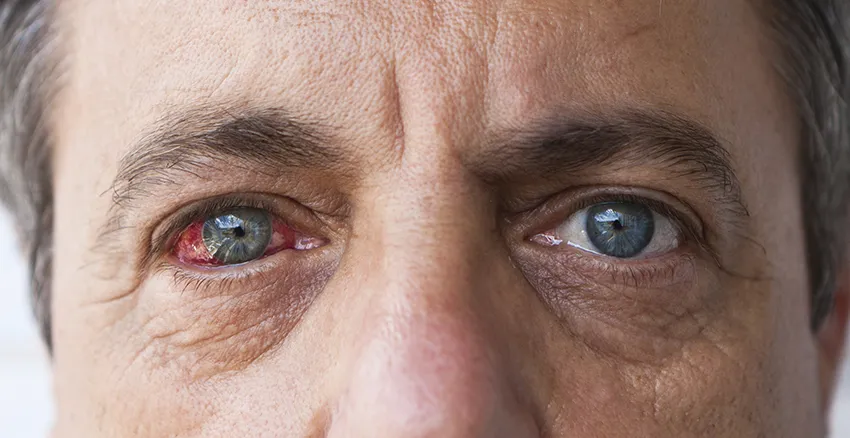Imagine living with diabetes and suddenly realizing that your vision is getting worse. It’s scary and concerning, right? Diabetes is a very serious health condition that doesn’t just affect your blood sugar levels—it can also seriously harm your eyes. Many people with diabetes face eye problems that can lead to vision loss if not managed properly.
In this blog, we will talk about common eye problems caused by diabetes, the symptoms to watch out for and provide you with information to help you take control of your eye health. Let’s dive in and discover how you can protect your eyes and keep your vision clear, even with diabetes.
Contents
Common Eye Problems Caused by Diabetes
Diabetes can lead to several serious eye conditions. Here are the most common ones and how high blood sugar levels can cause damage:
Diabetic Retinopathy

- What It Is: Diabetic retinopathy is a condition where high blood sugar levels damage the blood vessels in the retina, the part of your eye that senses light and sends signals to your brain.
- How It Happens: Over time, these damaged blood vessels can leak blood or other fluids, causing the retina to swell and leading to vision problems.
- Symptoms: Blurred vision, dark spots or floaters, and difficulty seeing at night.
If you’re experiencing any of these symptoms or are concerned about diabetic retinopathy, it’s crucial to seek professional help immediately. Early detection and treatment can save your vision. Don’t wait until it’s too late—book your free consultation today to get expert advice and personalized care for diabetic retinopathy. Click here to schedule your appointment now.
Cataracts
- What It Is: Cataracts are a condition where the lens of the eye becomes cloudy, leading to blurry vision.
- How It Happens: High blood sugar levels can cause changes in the lens proteins, making them clump together and form cloudy areas.
- Symptoms: Cloudy or blurred vision, faded colors, and increased glare from lights.
Glaucoma
- What It Is: Glaucoma is a group of eye conditions that damage the optic nerve, which is essential for good vision.
- How It Happens: Diabetes can increase the pressure inside your eye, which can damage the optic nerve over time.
- Symptoms: Gradual loss of peripheral vision (side vision), tunnel vision, and in advanced stages, blindness.
Diabetic Macular Edema (DME)
- What It Is: DME is a buildup of fluid in the macula, the part of the retina responsible for sharp, straight-ahead vision.
- How It Happens: High blood sugar can cause blood vessels to leak fluid into the macula, leading to swelling and vision impairment.
- Symptoms: Blurred or wavy central vision and colors appearing washed out.
How High Blood Sugar Levels Damage the Eyes
- Blood Vessel Damage: High blood sugar levels over time can weaken and damage the small blood vessels in your eyes, causing them to leak or become blocked.
- Fluid Buildup: Excess sugar in the blood can lead to swelling and fluid buildup in the lens and retina, impairing vision.
- Pressure Increase: Poorly controlled diabetes can increase eye pressure, leading to glaucoma and optic nerve damage.
Symptoms of Diabetic Eye Disease

Here are some warning signs and symptoms that might indicate diabetic eye problems:
- Blurred vision
- Dark spots or floaters in your vision
- Difficulty seeing at night
- Sudden vision loss
- Faded or washed-out colors
- Double vision
- Fluctuating vision clarity
- Eye pain or pressure
- Redness or swelling in the eyes
- Frequent headaches
- Seeing halos around lights
- Gradual loss of peripheral (side) vision
- Difficulty reading or seeing fine details
Preventive Measures for Diabetic Eye Health
Taking proactive steps can help prevent eye problems if you have diabetes. Here are some practical tips to keep your eyes healthy:
- Keep track of your blood sugar levels as recommended by your doctor.
- Take your diabetes medications or insulin as prescribed.
- Follow a balanced diet rich in fruits, vegetables, whole grains, and lean proteins. Avoid sugary foods and beverages.
- Include foods high in vitamins A, C, and E, as well as omega-3 fatty acids, which are beneficial for eye health.
- Drink plenty of water to stay hydrated and help your body function properly.
- Quit Smoking
- Stay away from environments with secondhand smoke.
- Keep an eye on your blood pressure and cholesterol levels.
- Adopt a healthy lifestyle with regular exercise and a balanced diet to keep these levels in check.
By following these preventive measures, you can significantly reduce the risk of developing diabetic eye problems and maintain better overall eye health.
Treatment Options for Diabetic Eye Conditions
There are several effective treatments available for managing diabetic eye conditions. Here’s an overview of the main options available.
- Laser Surgery
- Medications including anti-VEGF drugs and corticosteroids
- Vitrectomy
You can work with your eye care provider to choose the best approach for managing diabetic eye conditions and protecting your vision.
Your Contribution Can Help The Needy

Imagine struggling to see the world around you, your vision slowly fading due to conditions like diabetic retinopathy. Now, think about those who face this reality every day but can’t afford the treatment that could save their sight.
Your small gesture can mean a world of difference. By donating, you can help provide the life-changing treatments that these individuals desperately need.
Join hands with Eye Mantra Foundation and make a real difference today. Click on the “Donate Now” button or use the QR code to start helping today.
